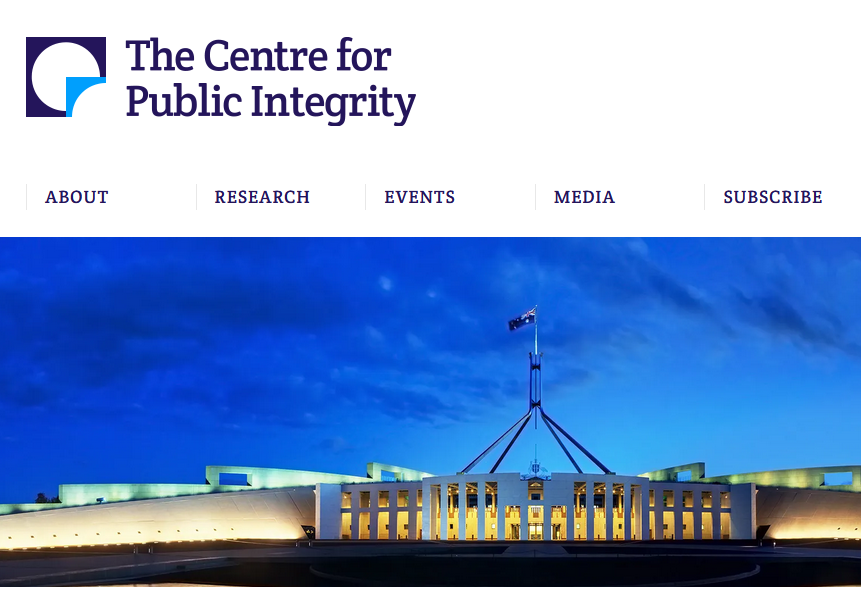
As Senate Estimates recently scrutinised the latest in a succession of election campaign rorts – this time cash for carparks – the Centre for Public Integrity (CPI) has highlighted fundemantal flaws in the Morrison Government’s exposure Bill for a Commonwealth Integrity Commission (CIC).
In fact, according to the CPI, the Government is the only major supporter of its Commonwealth Integrity Commission (CIC) exposure bill.
The Centre analysed 18 organisations’ submissions in response to the exposure Bill and found there is virtually unanimous opposition to the CIC’s jurisdiction and powers.
No organisation supports the CIC’s split into law enforcement and public sector divisions, or the high threshold to being investigations.
No organisation supports the CIC’s referral process and the inability for the public to make complaints.
Nine organisations support broadening the definition of corrupt conduct, one opposes.
Fifteen organisations support public hearings, one opposes.
“The proposed Commonwealth Integrity Commission will not be able to do its job,” said the Hon Anthony Whealy QC, Chair of the Centre. “It will not be able to investigate most cases of corruption, and it will keep everything hidden from public view.”
Stakeholders are united in calling for Government to broaden the jurisdiction and allow public exposure of investigations.
“The Government is the only major supporter of its CIC bill. It cannot proceed in its current form,” said Mr Whealy.
The consultation process resulted in more than 300 submissions being made to the Attorney-General’s Department.
To date, 218 of those submissions have been published, and the Centre for Public Integrity has analysed all those made by organisations to determine which deal with any of the following six key features of the Bill:
1. The proposed splitting of the Commission into two separate divisions (one dealing with law enforcement agencies, and the other with the public sector);
2. The narrow definition of corrupt conduct in respect of public sector corruption;
3. The limited ability of the Commission to undertake own motion investigations, and the restricted referral process, in respect of public sector corruption (including the preclusion of public and whistleblower complaints being investigated);
4. The ‘reasonable suspicion’ threshold in relation to public sector corruption;
5. The lack of power to hold public hearings in relation to public sector corruption; and
6. The lack of power to report publicly in relation to public sector corruption.
According to the Centre for Public Integrity the virtual unanimity on these key issues means that if the Federal Government wishes to be credible, it cannot proceed with the intransigence that has so far characterised its response to the Commonwealth Integrity Commission (CIC) consultation process.
“If its will is to create a Commission that is truly fit for purpose, its draft Bill requires substantial amendment.”
The draft Bill proposes to split the CIC into two separate divisions: one which deals with law enforcement, while the other deals with the public sector including parliamentarians and their staff.
The consultation revealed consensus that this split is undesirable and broadly unsupported by organisations including the Accountability Round Table, the National Integrity Committee, Transparency International Australia, the Law Council of Australia, the Australian Federal Police Association, the Police Federation of Australia.
As Transparency International Australia points out, the Commission “must be fair and equitable in its treatment of all federal public officials irrespective of status or role, and entities involved in federally funded services and contracts.”
CPI has recommended that the proposed splitting of the Commission into two separate divisions be abolished.
The CPI analysis also found weaknesses with the exposure Bill’s definitions of corruption.
For example, the definition of “corruption issues” contained at s 16(1) of the Bill captures certain circumstances where a person “engages in corrupt conduct” but another section, which applies to entities in the public sector division has a narrower definition.
The National Integrity Committee described the criminal offences limitation in the exposure Bill as a “fundamental flaw” and proposed that the definition of “corrupt conduct” be broad and capable of capturing “any conduct of any person that adversely affects or could adversely affect, directly or indirectly, the honest or impartial exercise of public administration”.
The Australian Human Rights Commission argued that for the Commission to be effective, a broad definition of “corrupt conduct” would be required so that serious misconduct which damages the integrity of public administration or public confidence in it, but may not constitute a criminal offence, is captured.
The CPI also found broad opposition to a “reasonable suspicion” threshold in the Bill and recommended that it be eliminated from the Bill as it would mean the Commission would “not be able to investigate public or whistleblower complaints, in respect of public sector corruption issues.
“These restrictions do not exist in relation to law enforcement corruption issues”.
The Australian Human Rights Commission notes that “there does not appear to be any evidence based justification for limiting the scope of the Integrity Commissioner’s power to conduct an own motion investigation within the public sector division”.
According to the CPI, while s 44 provides that law enforcement corruption issues may be referred by any person, the referral of public sector corruption issues is restricted.
Again, the restriction was not supported by a range of organisations including the Grattan Institute, Transparency International Australia, the Australian Human Rights Commission, Civil Liberties Australia and the Law Council of Australia.
The Accountability Round Table describes this restriction as putting parliamentarians and the public sector “in an immune and protected position for which there is no acceptable basis”.
The draft Bill prevents the Commission from holding public hearings in relation to public sector corruption issues.
The fact that the power to hold public hearings is essential for the proposed Commission to be effective is recognised by the Accountability Round Table, the Australian Human Rights Commission, Civil Liberties Australia, the CPSU, Corrs Chambers Westgarth, Transparency International, the Law Council of Australia, the Castan Centre for Human Rights Law and Australian Centre for Justice Innovation, the Human Rights Law Centre and Public Interest Advocacy Centre, the National Integrity Committee, the Vietnamese Australian Lawyers’ Association, Voices for Indi and the Uniting Church in Australia, Synod of Victoria and Tasmania.
The Vietnamese Australian Lawyers’ Association has warned that “The establishment of the CIC is nothing more than a sham process and exists to protect the public sector’s interest if corruption issues are dealt in secrecy”.
CPI recommends that the Commission have the power to hold public hearings in respect of any kind of corruption issue.
If the current version of the Bill were to stand, the proposed Commission would not be able to report its findings – or the evidence upon which they are based – in relation to public sector corruption issues.
It would not be able in any report on a corruption inquiry to include any opinion, finding or recommendation about a parliamentarian, the office of a parliamentarian or a staff member of the office of a parliamentarian.
The Law Council reports that “There appears to be no justification for limiting the reporting of findings and evidence relating to corruption issues or a finding of corrupt conduct to staff a law enforcement agency in the report of an investigation [sic], merely because of that staff member’s employment”.
CPI concludes that “It is evident from this analysis that many of the major defects of the Bill regarding the Commission’s jurisdiction and powers could be remedied by abolishing the unwarranted splitting of the CIC into two divisions with different powers, and instead creating one body with the powers currently proposed to be the exclusive domain of the law enforcement division.
“This would ensure that the Commission has appropriately broad jurisdiction – by expanding the concept of ‘corrupt conduct’, removing the ‘reasonable suspicion’ threshold, and ensuring it can undertake own motion investigations and act upon referrals from the public and whistleblowers – as well as the power to conduct public hearings as appropriate, and report publicly on its findings.
“The Centre for Public Integrity urges the Government to give genuine consideration to their submissions and amend its present, flawed model in order to create a Commission that is truly fit for purpose.”
Visit the CPI website if you want to keep up with its work and follow the Commonwealth Integrity Commission process.


